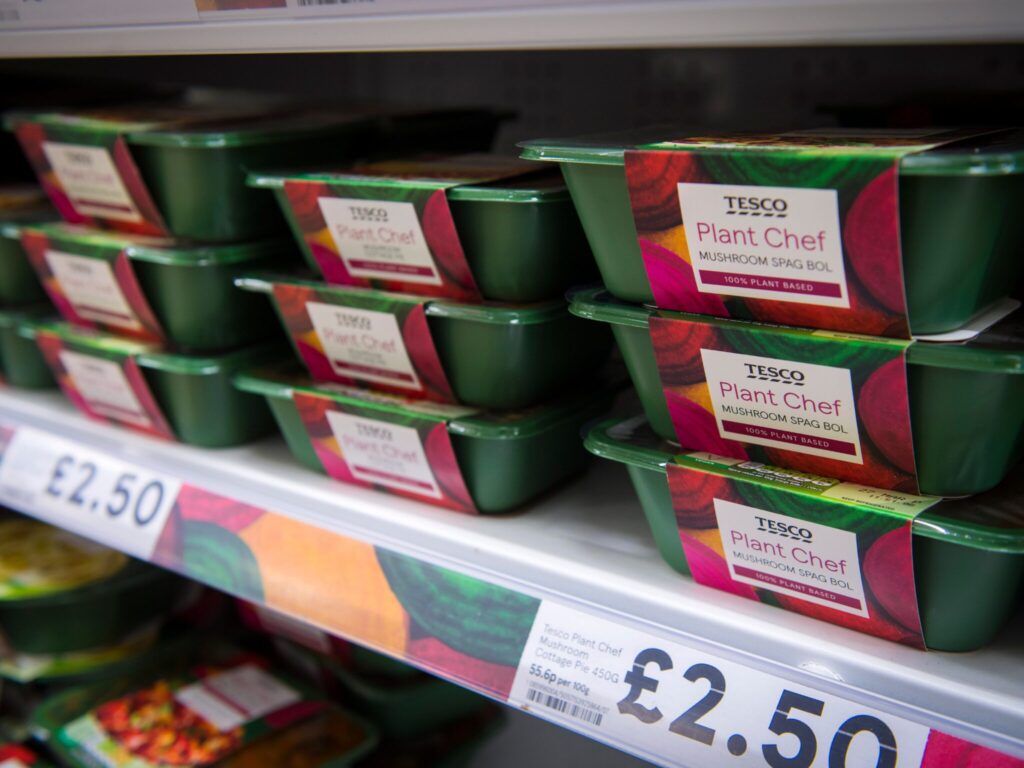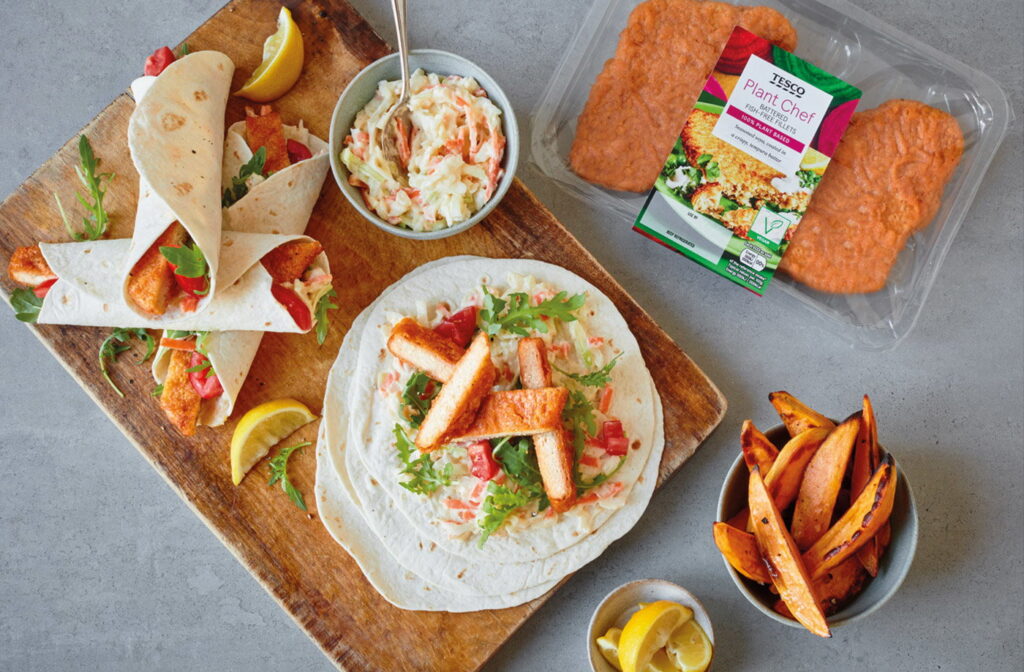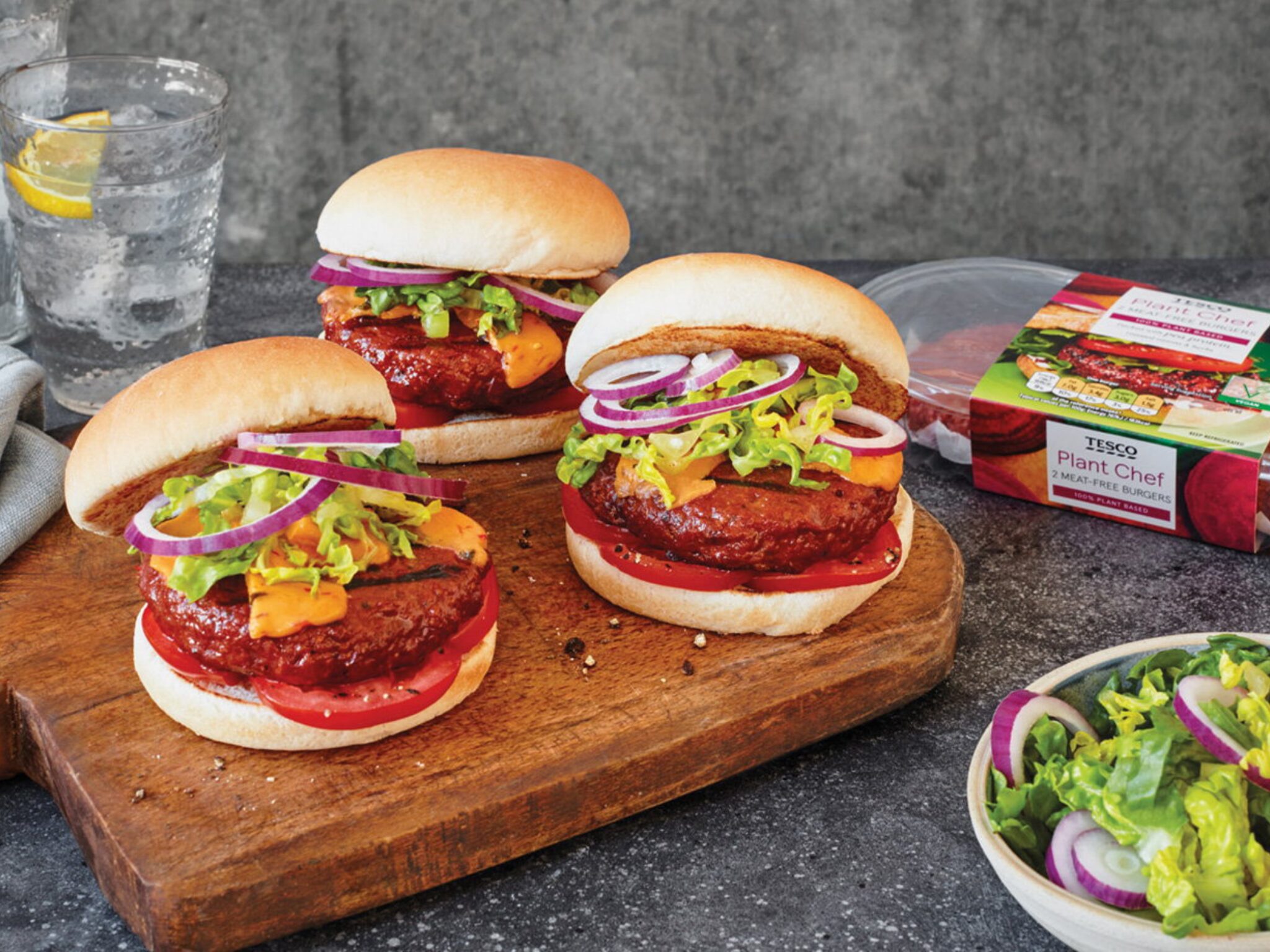5 Mins Read
UK supermarket Tesco is witnessing a rise in demand for plant-based food, following a slight dip in sales last year. The retailer says the plant-based industry is now in its “second phase”, with whole cuts a key growth point.
It’s no secret that the plant-based industry endured a challenging 2023, with sales of meat-free products in the UK (which include Quorn’s vegetarian SKUs too) falling by £38.4M. It was among the worst-performing grocery categories, with plenty of factors affecting the market, not least the cost-of-living crisis, concerns around ultra-processing, and dissatisfaction with the taste and texture of the products.
The UK’s biggest retailer, Tesco, also witnessed a decline (albeit a small one), which it ascribed to a drop-off in interest from “dabblers and the merely curious” for the “biggest food trend this century”. But things are turning around, with the retailer noting that the plant-based revolution is moving into its second phase now, as demand rises for meat-free ingredients and whole cuts.
The retailer’s plant-based food buyer Cate May said the “initial level of interest was inevitably going to drop off slightly”, but in this phase two, “we are seeing flexitarians now wanting to take more control over what they eat, whilst continuing to reduce their meat intake”.
Whole cuts and whole foods drive Tesco’s vegan growth

In the last three months, sales for plant-based fish products at Tesco are up by 100% compared to the same period last year. Similarly, vegan steak and chicken breasts have seen a 20% hike, while meatless burger purchases have increased by 10%. Even traditional plant proteins like tofu and tempeh grew by 20%.
Long touted as the “holy grail” of plant-based meat, whole cuts have slowly begun creeping into supermarkets across the world, and the steaks from Slovenia’s Juicy Marbles were one of the most notable successes for vegan food at Tesco. In fact, in the lead-up to Valentine’s Day, Tesco sold 100,000 vegan steaks, which it called “an unprecedented number for that occasion”.
“Customers are starting to understand the versatility of plant-based ingredients and whole cuts, and are creating a wide variety of meals such as tofu stir-fries, meat-free curries using chicken alternatives or beans and pulses, and classic steak and chips using plant-based steaks,” said May.
“Awareness is also starting to increase around the health benefits of making some simple swaps in their diet, for example, to reduce saturated fat whilst maintaining strong levels of protein by increasing the amount of plants and plant-based foods in their diets and then supplementing with more fresh veg.”
To highlight the increased consumption of whole foods, Tesco commissioned a survey of 2,000 UK adults in December, and found that 46% of Brits are eating more vegetables than they were five years ago. For 47%, introducing more vegetables to their plates was a deliberate decision, with the main reasons being health (82%), environmental impact (25%), and cost savings (22%). Even Sunday roasts – or the equivalent family meals – have seen an uptick, with 48% of respondents saying their roast dinners involve more vegetables now. For 60%, this meant three or more different types of vegetables.
This speaks to the prominence of whole-food plant-based mains on restaurant menus this Veganuary too: Burger King brought back its black bean burger; Wagamama, Pret A Manger and Zizzi highlighted mushrooms; Leon went all-in on gut health with a bhaji wrap; and Pizza Express introduced a veggie-packed calzone.
Vegetable and meat consumption trends in the UK

To May’s point about flexitarianism, there has been a drop in meat-eating in the UK. Government data from 2023 showed that meat consumption was at its lowest since records began almost half a century ago. So it perhaps may come as a surprise that fresh meat was actually one of the fastest-growing sectors in terms of retail sales, which were up by £352.5M.
However, inflation is key here: for example, the rise in sales for chicken (the top-performing food) was largely driven by a 13.4% price hike. This is why it wasn’t just meat intake that saw record lows among Brits – dairy went through the same thing. Those government figures also showed that Brits were eating 6% fewer fruits and vegetables than pre-pandemic levels.
But the renewed optimism for vegetables – at least according to Tesco’s data – can be explained by inflation too. A 1,000-person survey in October found that 62% of Brits feel plant-based meats cost much more than their conventional counterparts, with a fifth citing costs as the biggest reason for reducing their intake of these alternatives. Whole foods like vegetables will always be cheaper than meat analogues, so are naturally an appealing option for consumers with squeezed wallets.
This survey can explain the growing interest in whole cuts as well. For 66% of consumers, plant-based meat products taste much worse than their conventional counterparts, while 51% cite taste/texture as the biggest reason for reducing their consumption of meat alternatives. With whole cuts, which mimic the texture of muscle fibres in meat, consumers get the same mouthfeel and an elevated flavour experience.
These products are thus effective gateways into plant-based eating for meat-eaters looking to become flexitarians. There’s some way to go, though. A 2,003-person YouGov survey published in January shows that only 13% of Brits consider themselves flexitarian, which is a three-point drop from two years ago. Conversely, 73% call themselves meat-eaters, a three-point rise from January 2022. The poll revealed that only 2% of Brits are vegans, and 5% vegetarians. In contrast, research by Finder – published in January as well – estimated that 4.7% of UK adults follow a plant-based diet.
Either way, what’s clear is that food prices and associated health aspects are increasingly important for Brits, and vegetables will go a long way in alleviating those concerns. Tesco’s own-label Plant Chef range, which has over 180 items, features products like Vegetable Fingers, Spicy Bean Burgers and Katsu Style Veggie Crispbakes, alongside meat analogues too, in a bid to appeal to a wide range of consumers.
Even after cutting its private-label SKUs by over 500, the grocer managed to grow value sales by 10% with an innovation focus on “fast-growing categories such as plant-based”, with the five new frozen Plant Chef ranges rolled out this Veganuary. It was also the retailer that introduced Wicked Kitchen to the world. With a strong plant-based pedigree, Tesco will be hopeful of turning the category’s fortunes around in the UK this year.




